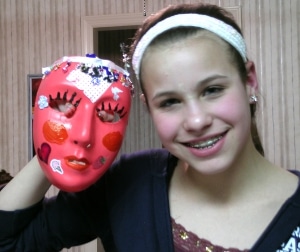
Every year at Purim, we tell the tale of a Jewish teenage girl who ascends to the throne of the Persian Empire by pretending not to be Jewish.
This year, Rabbi Sara Brandes looks at Megillat Esther (the Scroll of Esther) and a TED Talk by model Cameron Russell, and describes how in our programs Moving Traditions relates Purim to the two most pressing questions for teens:
“How should I act if I want to be accepted by my peers?”
In Persia’s capitol city, Esther must hide her true identity — that she is a Jewish girl named Hadassah — behind the mask of a beauty queen. When she arrives at the palace, Esther only does what Haggai, the guardian of the concubines, tells her to do. She bathes for six months in oil and six months in spices, and learns to paint herself with cosmetics. She changes to conform to the beauty standard of her day.
In these days of Facebook, Instagram, Twitter, and Vine, teens hide and mask their appearances in more ways than one. The pressure to appear “hot” for girls or “cool” for guys is felt countless times a day as photos are shared and commented on and ridiculed.
Eventually Esther — with the help of her uncle and mentor, Mordecai — finds the inner strength to remove her mask and reveal her Jewish identity.
Click here to watch the TED talk, “Image is Powerful” by Cameron Russell, who has been a model since the age of 16. Cameron shows her viewers how persuasive the mask of a “beauty queen” can be, and all that is concealed behind that superficial layer.
On Purim, we dress up in costumes. But, as Cameron Russell helps us see, we are constantly costuming ourselves, sending messages about how we want to be perceived in the clothes we wear and the choices we make.
This month, in Moving Traditions programs, Rosh Hodesh: It’s a Girl Thing! and Shevet Achim: The Brotherhood, many of the 4,000 teens who participate will consider the masks they wear and how and when they might take off those masks to let their true selves shine through.
At Moving Traditions, we are finding that Jewish teens need supportive communities of peers and mentors to wrestle with complex issues like these. Thank you for helping us to make this possible.